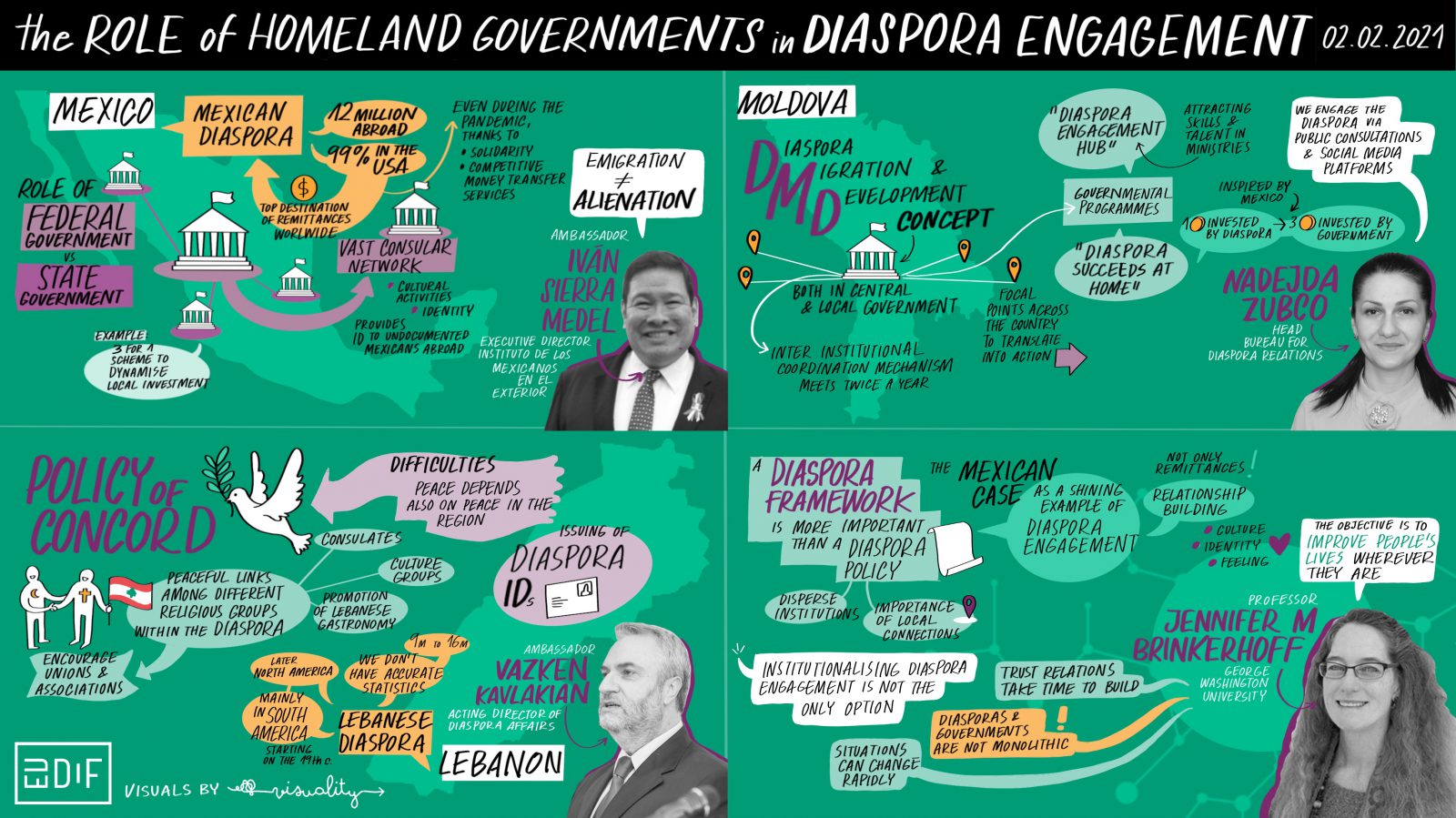
On Tuesday 2 February we hosted a webinar with representatives of Lebanon, Mexico and Moldova to discuss the role of homeland governments in diaspora engagement. The webinar illustrated three different diaspora engagement models, encompassing a variety of stances, programmes and institution types. Despite the varied set-ups, a number of patterns emerged.
Read on for the key takeaways from the insights shared by the panelists and the lively chat from the audience.
Top takeaways
Over the years, diaspora engagement has become increasingly institutionalised: As an increasing number of countries have acknowledged the contribution diaspora can make to development, the last decade has seen a proliferation of diaspora institutions. Of the 107 countries covered by the EUDiF global diaspora engagement mapping, 66 have a diaspora institution. Institutional models vary globally but can equally lead to promising results
“Nothing is possible without people but nothing lasts without institutions”
Mainstreaming diaspora engagement: Institutional and operational arrangements and responsibilities can be distributed across governmental levels and services to mainstream diaspora engagement at large. The national policy framework on mainstreaming migration into development in Moldova is an innovative way for Moldova to promote the mainstreaming of migration across all sectors via a network of diaspora, migration and development focal points in all central public authorities.
Diaspora engagement is not monolithic. Often, the most fruitful governmental efforts employ a variety of strategies, frameworks and programmes to enable diaspora mobilisation and remove barriers to engagement. For example, Mexico has developed a diaspora framework (which is implemented at both federal and state levels), rather than a specific diaspora engagement policy. The framework is evident in a collection of different official efforts, including laws, norms and institutions.
Adopting a diaspora policy is not the quintessence of diaspora engagement
Assistance first: relationship building through consular service and cultural diplomacy. Successful diaspora engagement models testify to the importance of proactively serving and reaching out to the diaspora before expecting any mobilisation for development initiatives. Improving and expanding consular services to protect and assist nationals in destination countries is an important activity in the trust building that is key for mutually beneficial engagement, e.g. through the issuance of consular identity cards to undocumented migrants as done by Mexican missions. In addition, Mexico heavily invested in facilitating remittances by supporting financial literacy training in the diaspora, working towards lowering money transfer rates and easing access to money even in remote areas. Thanks to this favourable environment, against all odds and attesting to the immense diaspora crisis solidarity, remittances increased in 2020 in Mexico.
What is the role of diaspora in development? A positive answer to the question: “Does diaspora contribute to development?” is often assumed and regularly ‘proven’ by remittances data. However, it is key for all citizens and policymakers to reflect on and discuss the concrete contributions made by diaspora to development, going beyond their financial contributions. Such reflections raise awareness, build trust and identify opportunities. New metrics to demonstrate the impact of diaspora engagement and associated contributions on development could benefit our understanding of the role of diaspora in development.
Moving beyond remittances. The speakers praised the results of cultural activities abroad in fostering feelings of belonging and identity, such as the World Lebanese Cultural Union and the Global MX Network. In another register, Lebanon has developed programmes to promote diaspora success stories – Lebanese Diaspora Energy Conference (LDE) –, connect with diaspora – Diaspora ID platform – and attract investments.
Think global, act local. Diasporans traditionally invest in their places of origin. Therefore, decentralising some aspects of diaspora engagement is critical. Sub-national initiatives such as Moldova’s DAR 1+3 Programme and its inspiration Mexico’s Tres por Uno have yielded impressive results.
Diaspora engagement takes commitment. It is a matter of building relationships and trust; a process that takes place over decades and evolves with the shifting global socio-political landscape and that of the diaspora in question. Long-term commitment from the government is essential to nurture relationships that can span generations.
The chat was lively, with many making new acquaintances, raising questions to each other as much as the panel. Three recurrent themes of question particularly stood out. We hope to unpack these in future publications and events:
- How do homeland governments include the diaspora in decision-making processes?
- What role could homeland governments play in encouraging the replication of diaspora engagement initiatives that have been successful at the local level?
- How important is diaspora diplomacy for development, especially in the post-pandemic context, and how can home governments invest in this area?
EUDiF would like to thank the panelists, Ambassador Vazken Kavlakian, Nadejda Zubco, Ambassador Iván Sierra Medel and Professor Jennifer M Brinkerhoff, and the audience for joining this lively event. We look forward to welcoming you to future discussions. In the coming months we will organise regionally-focused events, watch this space!
In the meantime, explore the graphic recordings from the event and download the country factsheets to learn more about the initiatives mentioned during the presentations: